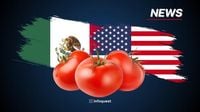In a significant development for the automotive industry, Honda's executives in Mexico have confirmed that there will be no changes to the company's production in the country. This announcement came on April 16, 2025, from Mexico's Secretary of Economy, Marcelo Ebrard, following reports suggesting that the Japanese automaker was considering moving some of its production from Mexico and Canada to the United States.
Ebrard shared this news via a post on X, aimed at alleviating concerns that arose after a report by the Nikkei newspaper indicated Honda's potential shift in manufacturing strategy. "There should not be any changes in the company's production in the country," Ebrard stated, underscoring the ongoing discussions between the government and Honda executives which led to this confirmation.
This decision comes despite challenges posed by new U.S. automotive tariffs. The automotive sector has been closely monitoring these developments, as they could significantly impact production costs and market dynamics in North America.
In another key area of trade between Mexico and the United States, Mexico's Minister of Agriculture and Rural Development, Húgio Berdegué, announced that Mexico will engage in negotiations with the U.S. following the Department of Commerce's proposal to impose a countervailing duty (CVD) of 20.91% on imported tomatoes from Mexico. This announcement was made during a press conference where Berdegué emphasized the need for a resolution within 90 days, ahead of the July 14 deadline when the proposed tax would take effect.
The tomato growers in the U.S., particularly in Florida, have long accused Mexican producers of unfairly pricing tomatoes. However, Berdegué dismissed these allegations as baseless and politically motivated. He remarked, "Since 1996, the export of our tomatoes has been conducted under an agreement following investigations into dumping," adding that "six out of ten tomatoes consumed in the U.S. are grown in Mexico. If this tax goes into effect, Americans will have to pay more for tomatoes, salads, ketchup... everything." He further noted that few countries can compete with Mexico in providing high-quality tomatoes at competitive prices.
In a related cultural initiative, the Mexican Embassy has announced a series of events to celebrate the 50th anniversary of diplomatic relations between Mexico and Vietnam, running from April 19, 1975, to April 19, 2025. On April 16, the embassy revealed an extensive program of cultural and commercial activities, including a special exhibition titled "Mexican Totem Journey: Gods, People and Nationalities." This exhibition aims to introduce the Vietnamese population to the richness of Mexican culture and is organized by the Vietnamese Women's Museum and provincial historical sites of Mexico.
The exhibition will take place at the Center for Fine Arts located at 93 Dinh Tien Hoang in Hanoi, and is set to showcase the depth of Mexico's ancient civilizations. Additionally, a contemporary art exhibition featuring works from young artists in Monterrey will be held from September to October 2025.
Another highlight of the program is the celebration of "Day of the Dead" (Día de muertos) on November 3, which is one of Mexico's most iconic cultural events. This event will be open to students from language departments and the Mexican Embassy in Vietnam, promoting the cultural significance of this traditional holiday.
On April 9, the Hanoi Film Archives premiered the Vietnamese-dubbed version of "The Wild Book" (El Libro Salvaje) by Mexican author Juan Villoro. This film is part of a broader cultural exchange, which also includes two special radio programs organized by the Mexican Institute of Radio (IMER): "A Sound Journey Through Traditional Mexican Music" and "Magical Sounds from Mexico," scheduled to air in Vietnamese on April 19.
The embassy's culinary initiatives also stand out, with the Mexican food program "50 Years of Nationalities and Images with Vietnam," featuring renowned chef Tomás Alanis from April 16 to May 16 at the Metropole Hanoi, a historical site that once served as the headquarters for the first Mexican embassy in Vietnam.
Moreover, in November, a "Tequila: Flavors from Mexico to Vietnam" event will be held, aimed at importers, distributors, and trade partners, with insights from tequila expert Gabriela Cañedo. This initiative is part of a larger effort to enhance trade and investment cooperation between Mexico and Vietnam.
Ambassador Alejandro Negrin emphasized the importance of these events, stating, "This project not only allows the Vietnamese people to get closer to Mexico but also reflects the tremendous potential for cooperation between our two countries. Over the past 50 years, we have built strong political and economic ties with Vietnam, and we are now working to strengthen that relationship across all dimensions."
As both nations navigate the complexities of trade and cultural exchanges, these initiatives highlight a commitment to fostering deeper connections and understanding between Mexico and Vietnam, showcasing the rich tapestry of cultural heritage and economic collaboration.


